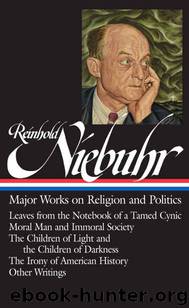Reinhold Niebuhr: Major Works on Religion and Politics: (Library of America #263) by Reinhold Niebuhr

Author:Reinhold Niebuhr [Niebuhr, Reinhold]
Language: eng
Format: epub, mobi
Publisher: Library of America
Published: 2015-04-07T04:30:00+00:00
2
There is an ironic aspect in the communist indictment of a religious culture, particularly when applied to America. According to communism, religion is a consolation for weak hearts who have failed to master life’s “extraneous forces.” It will vanish away when man learns not only to “propose” but to “dispose” over “the extraneous forces which control men’s daily lives.” Actually all the healthy western nations who have managed to throw off the poison of communism have been prompted by both religious and secular motives to conquer nature and reform society in the interest of man’s comfort and security. They have succeeded rather better than communism in bringing “abundance” to the people. They have erred not so much in despising the comforts of this life as in promising men more comfort in life than can be fulfilled, particularly since the same technics which provide the comfort also create the weapons by which the enmity between ourselves and our brothers is sharpened.
Consideration of the American cult of prosperity cannot be dismissed without viewing one additional facet of the phenomenon. If the alleged preoccupation of the American people with living standards is primarily derived from the breadth of opportunity on a new continent and from Calvinist and Jeffersonian conceptions of religion and virtue, it also has other, less observed, roots. It is Spengler’s thesis that the extravert interests, related to the scientific, technical and social problems of a civilization, are released when the death of a culture has chilled the introvert interests, which create philosophical, religious and æsthetic disciplines. Thus American “go-getting” would be related to the flowering of Western European civilization as Roman bridge and road building was related to the spring-and-summer-time of Græco-Roman culture. In each case it represents the winter of decay. De Tocqueville suggests a similar thesis in his observations of American life, when he contrasts the extravert activities of our “democracy” with the purer culture of the more traditional world. “A democratic state of society,” he declared, “keeps the greater part of man in a constant state of activity; and the habits of mind which are suited for the active life are not always suited for a contemplative one. . . . The greater part of men who constitute these (the democratic) nations are extremely eager in the pursuit of actual and physical gratification. As they are always dissatisfied with the position which they occupy and are always free to leave it, they think of nothing but the means of changing their fortune or increasing it.”§
In ascribing preoccupation with the material basis of life to democracy De Tocqueville may not do justice to all aspects of the issue, but he does place his finger upon an unsolved problem of our democracy. For it is certainly the character of our particular democracy, founded on a vast continent, expanding as a culture with its expanding frontier and creating new frontiers of opportunity when the old geographic frontiers were ended, that every ethical and social problem of a just distribution of
Download
Reinhold Niebuhr: Major Works on Religion and Politics: (Library of America #263) by Reinhold Niebuhr.mobi
This site does not store any files on its server. We only index and link to content provided by other sites. Please contact the content providers to delete copyright contents if any and email us, we'll remove relevant links or contents immediately.
| Africa | Americas |
| Arctic & Antarctica | Asia |
| Australia & Oceania | Europe |
| Middle East | Russia |
| United States | World |
| Ancient Civilizations | Military |
| Historical Study & Educational Resources |
Cat's cradle by Kurt Vonnegut(15339)
Pimp by Iceberg Slim(14489)
4 3 2 1: A Novel by Paul Auster(12377)
Underground: A Human History of the Worlds Beneath Our Feet by Will Hunt(12090)
The Radium Girls by Kate Moore(12019)
Wiseguy by Nicholas Pileggi(5771)
The Fire Next Time by James Baldwin(5432)
Perfect Rhythm by Jae(5398)
American History Stories, Volume III (Yesterday's Classics) by Pratt Mara L(5301)
Paper Towns by Green John(5181)
Pale Blue Dot by Carl Sagan(4996)
A Higher Loyalty: Truth, Lies, and Leadership by James Comey(4955)
The Mayflower and the Pilgrims' New World by Nathaniel Philbrick(4495)
The Doomsday Machine by Daniel Ellsberg(4485)
Killers of the Flower Moon: The Osage Murders and the Birth of the FBI by David Grann(4443)
The Sympathizer by Viet Thanh Nguyen(4385)
Too Much and Not the Mood by Durga Chew-Bose(4338)
The Borden Murders by Sarah Miller(4315)
Sticky Fingers by Joe Hagan(4189)
